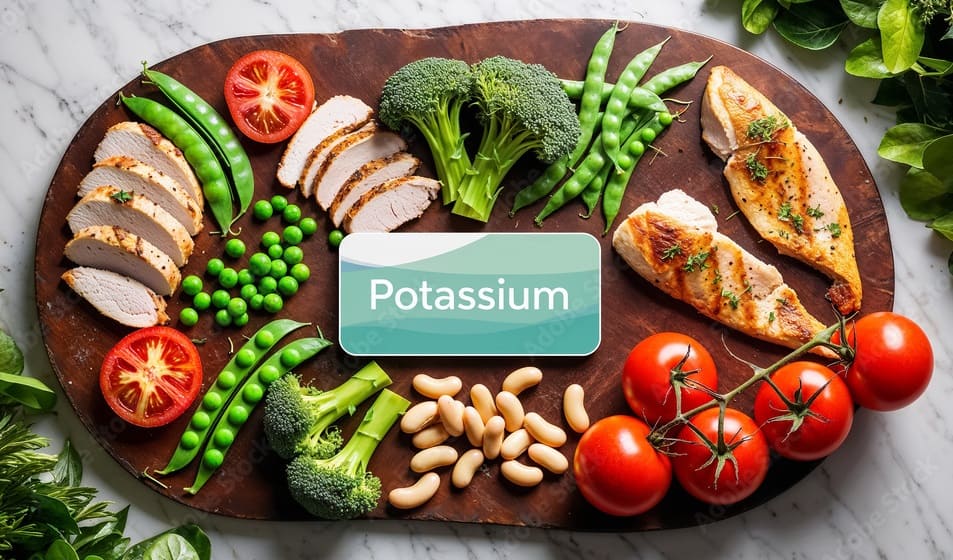Potassium might not always be the star of the show when it comes to nutrition, but it plays a critical role in keeping your body running smoothly. It’s an essential electrolyte that helps regulate fluid balance, nerve signals, and muscle contractions. But what happens when potassium levels dip below normal? Let’s dive into the symptoms, causes, and how to address low potassium levels (a condition called hypokalemia) to keep your health in check.
Role of Potassium in Your Body
Potassium is essential for various bodily functions, including:
- Muscle Function: Potassium helps muscles contract properly, including the all-important heart muscle.
- Nerve Communication: It aids in transmitting signals between nerves and muscles.
- Fluid Balance: Potassium works with sodium to maintain the balance of fluids in your body.
A deficiency can disrupt these processes, leading to noticeable symptoms and potential health risks.
Signs of Low Potassium Levels
When potassium levels drop, your body sends signals that something’s off. Here are the most common symptoms:
- Muscle Weakness and Cramps: Without enough potassium, muscles may not function properly, leading to cramps, spasms, or weakness.
- Fatigue: A lack of potassium can leave you feeling drained, even after a full night’s rest.
- Irregular Heartbeat: Potassium plays a key role in heart rhythm. Low levels might cause palpitations or arrhythmias.
- Constipation: Potassium supports smooth muscle function, including in the digestive system. A deficit can slow digestion.
- Tingling or Numbness: Nerves also rely on potassium. A lack of it can cause tingling sensations or numbness, often in the extremities.
Causes of Low Potassium Levels
Hypokalemia can be triggered by several factors, including:
- Excessive Losses: Vomiting, diarrhea, or heavy sweating can deplete potassium levels.
- Medications: Diuretics, certain antibiotics, and laxatives can lead to potassium loss.
- Poor Diet: A diet low in potassium-rich foods (like bananas, oranges, and spinach) may contribute.
- Chronic Conditions: Issues like kidney disease or hormonal imbalances can affect potassium levels.
Risks of Severe Hypokalemia
While mild cases of low potassium might only cause discomfort, severe hypokalemia can be life-threatening. It may lead to:
- Paralysis: In extreme cases, muscle weakness can escalate to temporary paralysis.
- Respiratory Issues: The muscles that help you breathe can be affected.
- Cardiac Arrest: Potassium imbalances can disrupt the heart’s rhythm, posing a serious risk.
How to Restore Potassium Levels
If you suspect your potassium levels are low, here’s what you can do:
- Eat Potassium-Rich Foods: Add bananas, oranges, spinach, sweet potatoes, and avocados to your meals.
- Stay Hydrated: Proper hydration supports electrolyte balance.
- Monitor Medications: Talk to your doctor if you’re on diuretics or other medications that might affect potassium levels.
- Consider Supplements: In severe cases, a healthcare provider may recommend potassium supplements.
Prevention Tips
Keeping potassium levels balanced isn’t hard if you stay proactive. Some tips include:
- Eating a well-rounded diet with plenty of fruits and vegetables.
- Staying hydrated, especially in hot weather or during intense exercise.
- Checking with your doctor about potential medication side effects.
When to Seek Help
If you experience severe symptoms like heart palpitations, difficulty breathing, or extreme muscle weakness, seek medical attention immediately. Hypokalemia can be serious, but it’s also treatable with timely intervention.
Potassium might not get as much attention as other nutrients, but it’s essential for a healthy, functioning body. By being mindful of your diet and paying attention to your body’s signals, you can avoid the complications of low potassium levels and keep feeling your best.
Also Read:
